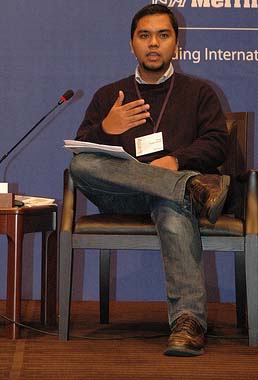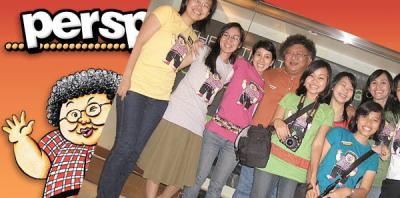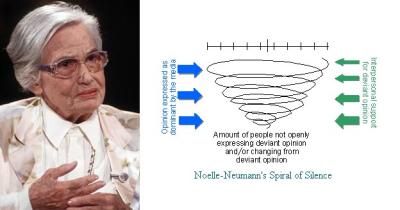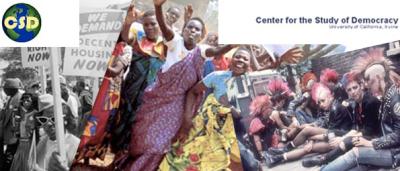PART TWO of the interview series: ENDA NASUTION - THE FATHER
Although a father in real life, he seems a bit young to be dubbed 'the father' of the Indonesian blogosphere. Nevertheless, he has gained this reputation, simply by being among the first bloggers to get serious about it, and by actively encouraging and supporting the blogging community with his know-how. He was the Chairperson of last year´s Pesta Blogger
I chatted with Enda Nasution about blogging culture in general, the atmosphere of the Indonesian blogosphere and I got some insight on certain 'hot topics' of Indonesian bloggers... The following is a recap of our chat, Enda´s words grouped into thematic blocks and only with minor changes and shortenings.

The benefits of blogging
I like the idea that blogs upset the current media industry’s status quo, that was the first thing that attracted me to blogging. Giving access and voices to millions of people where they can write and express themselves easily, fast and without significant cost is pretty great!
I like to think that by blogging we are promoting ideas of solidarity, being open minded, accountable and participative, young people especially should not sit and stand aside but now can be heard and read as well. They will become more empowered, more confidant, more opinionated. To do that people need to read a lot, learn a lot of things, think structurally and communicate well. Those are qualities that I find positive and we as Indonesian bloggers want to promote and spread this attitude.
You can't blog in a vacuum. it's connected to one another, the blogging community motivates each blogger to keep blogging.
Some people are concerned about the quality of the content of blogs which sometimes seems trivial and self absorbed but I think those concerns, even though they are valid, are secondary. The first thing is that people start blogging, the quality will improve as the bloggers are exposed to more quality writing. Of course we as community will help anywhere we can. it's like the open source movement: given enough bloggers, the whole community will rise up.
But to tell you the truth I was much more optimistic 2-3 years ago, not that I am losing all hopes, but I am more realistic now, maybe it's the old age creeping inside of me or something…
It depends on what to benchmark the progress of course, when asked whether bloggers will have a positive effect on the public I always say yes, on a personal level it promotes an attitude that I have mentioned before, which are positive things to have.
Internet users in Indonesia
I don't if techno-elite it's the correct term, but Indonesian internet users are better educated, have better income than the rest of non internet users. But in terms of profile, it consist of mostly male/female 18-28. With a rising number of even younger users
I was arguing on a piece on Jakarta Post in 2004 that this internet users act as influencer to the other non internet users, this was in context of the presidential election, my point was that the presidential campaign should pay attention to online more, or use online combined with on-ground volunteers.
Blogs and traditional media
Especially in Indonesia’s case there is a shortage of content from the online media. Here the number of topics covered online is limited, that's the hole that the bloggers have been filling in. On the other hand, the traditional media becomes an echo chamber of the blogosphere. Several times, magazines or newspapers copy paste word for word a blog post and publish it. Others use blogs as source of information. There are even plans to discuss blog posts on a radio program, giving a different twist on the whole new media - old media debate.
The only new media, purely online is detik.com. The other online media is the online version of traditional online media, like Kompas and Tempo. So I think the more correct term will be mainstream media vs. alternative media. The mainstream media all realize the power of blogs, their take on that is to create their brand of blogs. So wait for kompasblog.com, detikblog.com, tempoblog.com. It's coming.
But traditional media are often struggling with the web 2.0 world, because the internal push-pull interest inside. I think, most of their efforts online will stumble as well. They view online as another distraction with time and effort to put in.
The Indonesian example of citizen journalism is wikimu.com. It is overlapping, the Indonesian wikipedians, Indonesian bloggers and people who wrote in wikimu, but somehow i think each are different breeds.
Bapak Blog Indonesia?
All i did was to blog, quite at the beginning but I was not the first one. And I wrote an article to explained what blogging is, which became popular and is still referred to by people who want to know about blogging. I think it was started as a joke, not a serious/real position, nobody elected me or anything, but then it was picked up by mainstream media, and there I am. Especially after chairing Pesta Blogger in October last year. People and journalists will ask me: what's next and what do you see for the Indonesian blogosphere in the future etc.
The climate of the Indonesian Blogosphere
Malaysia, Singapore, Vietnam, Cambodia… I was on a conference in Manila discussing free expression in cyberspace and it was clear that Indonesia is one of the countries where we currently enjoy freedom of expression.
But then again, intimidation and repression can take many forms and can come from many groups in public. There is already a case of a blogger from Yogyakara threatened by a lawsuit and ordered to take down his post by a kyai (muslim religious leader) in Jakarta. The blogger took down his post, even though the threat was baseless. His post was not in any way directed to the kyai. But the blogger took down his post anyway.
In the near future I expect there will be more vertical and horizontal conflict in the Indonesian blogosphere, vs. mainstream media, vs. other parts of the public.
Right now I think we are still in honeymoon, everything handy dandy…
The atmosphere here is very communal, Indonesians love to chit chat and hang out together, and that has now translated to online behavior too.
Bloggers, friends and ‘enemies’
From what Mohammad Nuh says, his perspective on blogging was that it's a positive activity, for the youth especially, and he said that anything positive, especially for the youth should be supported because the future of a nation depends on it's youth.
Roy Suryo I think holds a grudge against the Indonesian blogger community. He seeks attention from the media and positioned himself as an expert in IT and the telecommunication industry, where in fact he really doesn't know that much about both subjects. I think the blogosphere does have an impact on RS image, journalists are now more reluctant to ask him for his opinion, especially for important stuff, but on the celebrity gossip he still appears from time to time.
Kampung Gajah is just an inside joke that we have, but it’s because a lot of figures in the Indonesian blogosphere are members there. So flow of information sometimes starts there and is shared to the groups, or vice versa.
Thanks Enda!
I chatted with Enda Nasution about blogging culture in general, the atmosphere of the Indonesian blogosphere and I got some insight on certain 'hot topics' of Indonesian bloggers... The following is a recap of our chat, Enda´s words grouped into thematic blocks and only with minor changes and shortenings.

The benefits of blogging
I like the idea that blogs upset the current media industry’s status quo, that was the first thing that attracted me to blogging. Giving access and voices to millions of people where they can write and express themselves easily, fast and without significant cost is pretty great!
I like to think that by blogging we are promoting ideas of solidarity, being open minded, accountable and participative, young people especially should not sit and stand aside but now can be heard and read as well. They will become more empowered, more confidant, more opinionated. To do that people need to read a lot, learn a lot of things, think structurally and communicate well. Those are qualities that I find positive and we as Indonesian bloggers want to promote and spread this attitude.
You can't blog in a vacuum. it's connected to one another, the blogging community motivates each blogger to keep blogging.
Some people are concerned about the quality of the content of blogs which sometimes seems trivial and self absorbed but I think those concerns, even though they are valid, are secondary. The first thing is that people start blogging, the quality will improve as the bloggers are exposed to more quality writing. Of course we as community will help anywhere we can. it's like the open source movement: given enough bloggers, the whole community will rise up.
But to tell you the truth I was much more optimistic 2-3 years ago, not that I am losing all hopes, but I am more realistic now, maybe it's the old age creeping inside of me or something…
It depends on what to benchmark the progress of course, when asked whether bloggers will have a positive effect on the public I always say yes, on a personal level it promotes an attitude that I have mentioned before, which are positive things to have.
Internet users in Indonesia
I don't if techno-elite it's the correct term, but Indonesian internet users are better educated, have better income than the rest of non internet users. But in terms of profile, it consist of mostly male/female 18-28. With a rising number of even younger users
I was arguing on a piece on Jakarta Post in 2004 that this internet users act as influencer to the other non internet users, this was in context of the presidential election, my point was that the presidential campaign should pay attention to online more, or use online combined with on-ground volunteers.
Blogs and traditional media
Especially in Indonesia’s case there is a shortage of content from the online media. Here the number of topics covered online is limited, that's the hole that the bloggers have been filling in. On the other hand, the traditional media becomes an echo chamber of the blogosphere. Several times, magazines or newspapers copy paste word for word a blog post and publish it. Others use blogs as source of information. There are even plans to discuss blog posts on a radio program, giving a different twist on the whole new media - old media debate.
The only new media, purely online is detik.com. The other online media is the online version of traditional online media, like Kompas and Tempo. So I think the more correct term will be mainstream media vs. alternative media. The mainstream media all realize the power of blogs, their take on that is to create their brand of blogs. So wait for kompasblog.com, detikblog.com, tempoblog.com. It's coming.
But traditional media are often struggling with the web 2.0 world, because the internal push-pull interest inside. I think, most of their efforts online will stumble as well. They view online as another distraction with time and effort to put in.
The Indonesian example of citizen journalism is wikimu.com. It is overlapping, the Indonesian wikipedians, Indonesian bloggers and people who wrote in wikimu, but somehow i think each are different breeds.
Bapak Blog Indonesia?
All i did was to blog, quite at the beginning but I was not the first one. And I wrote an article to explained what blogging is, which became popular and is still referred to by people who want to know about blogging. I think it was started as a joke, not a serious/real position, nobody elected me or anything, but then it was picked up by mainstream media, and there I am. Especially after chairing Pesta Blogger in October last year. People and journalists will ask me: what's next and what do you see for the Indonesian blogosphere in the future etc.
The climate of the Indonesian Blogosphere
Malaysia, Singapore, Vietnam, Cambodia… I was on a conference in Manila discussing free expression in cyberspace and it was clear that Indonesia is one of the countries where we currently enjoy freedom of expression.
But then again, intimidation and repression can take many forms and can come from many groups in public. There is already a case of a blogger from Yogyakara threatened by a lawsuit and ordered to take down his post by a kyai (muslim religious leader) in Jakarta. The blogger took down his post, even though the threat was baseless. His post was not in any way directed to the kyai. But the blogger took down his post anyway.
In the near future I expect there will be more vertical and horizontal conflict in the Indonesian blogosphere, vs. mainstream media, vs. other parts of the public.
Right now I think we are still in honeymoon, everything handy dandy…
The atmosphere here is very communal, Indonesians love to chit chat and hang out together, and that has now translated to online behavior too.
Bloggers, friends and ‘enemies’
From what Mohammad Nuh says, his perspective on blogging was that it's a positive activity, for the youth especially, and he said that anything positive, especially for the youth should be supported because the future of a nation depends on it's youth.
Roy Suryo I think holds a grudge against the Indonesian blogger community. He seeks attention from the media and positioned himself as an expert in IT and the telecommunication industry, where in fact he really doesn't know that much about both subjects. I think the blogosphere does have an impact on RS image, journalists are now more reluctant to ask him for his opinion, especially for important stuff, but on the celebrity gossip he still appears from time to time.
Kampung Gajah is just an inside joke that we have, but it’s because a lot of figures in the Indonesian blogosphere are members there. So flow of information sometimes starts there and is shared to the groups, or vice versa.
Thanks Enda!
texastee - 16. Jun, 16:40
3 comments - add comment - 0 trackbacks






